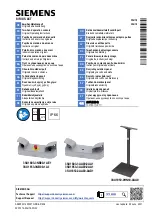
18
WIDE
BYPASS
10
0
10
0
REVERBS
DELAYS
CHORUS/FLANGE/PHASER
DAMPING
DEPTH
TIME
RATE
NORMAL
NORMAL
EFX
SM. ROOM
MD. PLATE
LG. PLATE
LG. HALL
GATED
REVERSE
CATHEDRAL
MD. HALL
SPRING
PHASER
DELAY 4
CHORUS
DELAY 3
DELAY 1
FLANGE
DELAY 2
U
+15
O
O
U
+15
O
O
U
+15
O
O
U
+15
O
O
EFX
2
SEND
TO MAIN MIX
EFFECTS TO MONITOR
AUX
1
AUX
2
CLIP
DIGITAL STEREO EFFECTS PROCESSOR
EFX 2 (INT) RETURN MASTERS
EMAC
effects, with their levels already deter-
mined by the channels’
EFX 2 (EXT)
knob, you’ll
typically set this knob near the “
U
” mark and
then leave it alone.
EFFECTS TO MONITOR
This works just like the channel
AUX
knobs, but here, the source signal is the
EFX 2
RETURN
and the
EMAC
output. Typically, this
knob is used to add effects to the stage monitors.
Turned fully up, it provides 15 dB of addi-
tional gain, the center “
U
” mark is unity gain,
and fully down is off.
PRESET SELECT
Rotate this detented switch to select the
preset effect you want to use.
Preset Effects Descriptions
Reverbs
The reverbs are designed to provide a wide
variety of reverb sounds for vocal and instru-
ment applications. In the following description,
tail
refers to the refl ections that follow the
initial sound event, also referred to as
decay
range
.
Pre-delay
is the amount of time be-
tween the initial sound event and the fi rst
refl ection.
TIME/RATE
controls the length of the
tail, with the shortest tail at the
0
position and
the longest tail at
10
.
DAMPING/DEPTH
controls the damping, with the darkest tone at
0
and the brightest tone at
10
. The
WIDE
switch is very effective at increasing the stereo
image of the reverb effect.
REVERSE:
Standard reverse reverb, simu-
lating a tail-fi rst effect
increasing to the original
note. Decay range is
adjustable from 35 ms to
515 ms. No pre-delay.
GATED:
Standard
gated reverb, where
the reverb tail is cut off
sharply after the preset
decay length. Decay
range is adjustable from
35 ms to 515 ms. No pre-
delay.
CATHEDRAL:
Dense,
smooth reverb with very
long tail, long pre-delay,
and late refl ections. Tails
are very warm with some
additional high-end
refl ections imitating
the stone walls of a
cathedral. A very dramatic effect that works
well with wind instruments such as fl ute, slow
fi nger picking on acoustic guitar, and quiet vo-
cal group harmony and choirs. Also works well
with keyboards and drums using short decay.
Decay range is adjustable from 2 seconds to 10
seconds. Pre-delay set at 75 ms.
LG. HALL:
Dense, smooth reverb with long
tail, long pre-delay, and some early refl ections.
Tails are warm with more apparent high end.
Works well with vocals and electric and acous-
tic guitar. Decay range is adjustable from 1
second to 5 seconds. Pre-delay set at 75 ms.
MD. HALL:
Dense, smooth reverb with nor-
mal tail, normal pre-delay, and increased early
refl ections. Tails are warm with more apparent
high end. Works well with vocals and electric
and acoustic guitar. Decay range is adjustable
from 750 ms to 2.5 seconds. Pre-delay set at 65ms.
LG. PLATE:
Good early refl ections and no
pre-delay. Tails are normal and warm with
strong high end for increased presence. Perfect
for vocals and snare. Decay range is adjustable
from 1 second to 5 seconds. No pre-delay.
MD. PLATE:
Good early refl ections and no
pre-delay. Tails are short and warm with strong
high end for increased presence. Perfect for
tight vocals and snare. Decay range is adjust-
able from 750 ms to 2.5 seconds. No pre-delay.
SM. ROOM:
Reverb featuring very fast and
scattered early refl ections with a short pre-de-
lay. Tails are very short and warm with normal
high-end imitating absorbent wall materials
and audience. Good for tight vocal effects.
Decay range is adjustable from 250 ms to 1 sec-
ond. Pre-delay set at 30 ms.
SPRING:
Mimics the
vintage 60’s-style wet
spring reverb effect. Tails
are normal with strong
high end and a slight
waver imitating the slow
fl utter of the mechani-
cal spring system. Very
good with acoustic guitar.
Decay range is adjustable
from 1 second to 5 sec-
onds. No pre-delay.
Delays
There are four delays
available with one, two,
three, and four repeats.
TIME/RATE
controls
the time between repeats,
with the fastest repeats
at the
0
position and the







































